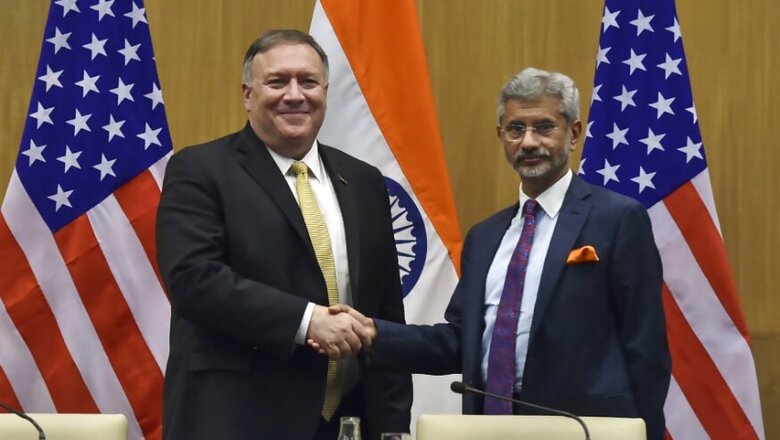
views
New Delhi: As External Affairs Minister S Jaishankar travels to Washington DC for the Indo-US 2+2 dialogue on Wednesday, India is expecting questions in the course of the conversation on the Citizenship Amendment Act (CAA).
While the defence and external affairs ministers will engage with their US counterparts on issues ranging from operationalisation of COMCASA (Communications Compatibility and Security Agreement), defence cooperation and regional security, News 18 has learnt that Jaishankar is expected to clarify the government's position to his American counterpart Mike Pompeo when the two meet for a separate half-an-hour session at 9.15pm (IST).
Jaishankar is likely to broadly echo what has been said in Parliament that the law doesn’t apply to Indian citizens and is only meant to give citizenship to persecuted minorities from three neighbouring countries.
However, with the constant reactions emanating from the US since the passage of the bill in Lok Sabha, some suggest that this may not be the end of the conversation over CAA. A source also suggested that clubbed with questions regarding continued restrictions in Kashmir, questions at the international stage are bound to be asked on the overall situation in the country.
On December 14, US ambassador at large for international religious freedom Sam Brownback had tweeted: “One of #India’s great strengths is its Constitution. As a fellow democracy, we respect India’s institutions, but are concerned about the implications of the #CABBill. We hope the government will abide by its constitutional commitments, including on religious freedom.”
The US State Department's Bureau of Central and South Asia retweeted Brownback's comment. Meanwhile, the US House Foreign Affairs Committee on December 10 had tweeted “Religious pluralism is central to the foundations of both India and the United States and is one of our core shared values. Any religious test for citizenship undermines this most basic democratic tenet.”
In fact, the Congressional committee had taken a very stern view of the proposed legislation on October 22 itself during a discussion on human rights in South Asia, which focussed heavily on Kashmir. The chair had made Assistant Secretary of State Alice Wells condemn any such move by the Indian government that had “exclusionary provisions” like the CAA that leaves out Muslims in particular.
The most scathing statement, however, has come from the independent but influential body — the US Commission on International Religious Freedom — which recommended that the US government impose sanctions on Home Minister Amit Shah and other leaders if the bill passes Parliament. Their statement was put out right after the bill sailed through Lok Sabha.
The Ministry of External Affairs had dismissed the statement by USCIRF as one based on lack of knowledge about the law and prejudiced.
The US may be the only country to have overtly expressed concerns and indicated action. However, News18 has learnt that there are at least two other P5 countries of the UNSC that are keeping a close eye on the developments as they unfold with large-scale protests against the Citizenship Amendment Act right from Northeast India to the rest of the country with students taking to the streets. The issue is likely to crop up in more conversations depending on what reassurances emanate from the government, a source added.




















Comments
0 comment